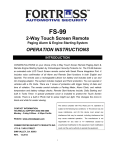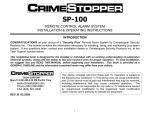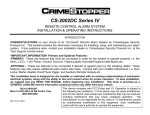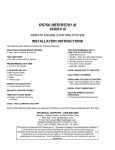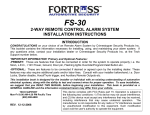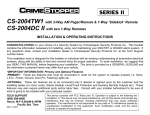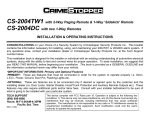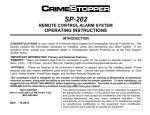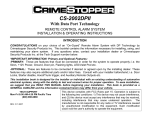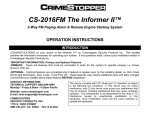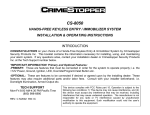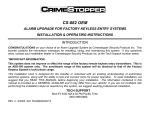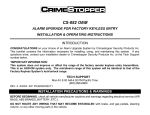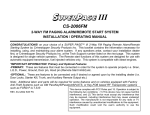Download CrimeStopper CS-2000DPII Operating instructions
Transcript
CS-2000DPII TW2 With 2-Way Data Port Technology 2-WAY REMOTE CONTROL ALARM SYSTEM INSTALLATION & OPERATING INSTRUCTIONS INTRODUCTION CONGRATULATIONS on your choice of an “On-Guard” Remote Alarm System by Crimestopper Security Products Inc. This booklet contains the information necessary for installing, using, and maintaining your alarm system. If any questions arise, contact your installation dealer or Crimestopper Security Products Inc. at the Tech Support number below. *IMPORTANT INFORMATION: Primary and Optional Features: -PRIMARY: These are features that must be connected in order for the system to operate properly; i.e. the Siren, L.E.D., +12V Power, Ground, Door pin, Flashing lights Override/Program/Valet Button etc. -OPTIONAL: These are features to be connected if desired or agreed upon by the installing dealer. These features may also require additional parts and/or labor fees. Consult with your installer beforehand; i.e. Door Locks, Starter disable, Hood/Trunk trigger, and Auxiliary Remote Outputs etc. This installation book is designed for the installer or individual with an existing understanding of automotive electrical systems, along with the ability to test and connect wires for proper operation. To ease installation, we suggest that you READ THIS MANUAL before beginning your installation. This book is provided as a GENERAL GUIDLINE and the information contained herein may differ from your vehicle. TECH SUPPORT Mon-Fri 8:00 AM-4:30 PM Pacific Time (800) 998-6880 REV. C 2-07-2007 This device complies with FCC Rules part 15. Operation is subject to the following two conditions: 1) This device may not cause interference, and (2) this device must accept any interference that may be received, including interference that may cause undesired operation. The manufacturer is not responsible for any radio or TV interference caused by unauthorized modification to this equipment. Such modification could void the user's authority to operate the equipment. TABLE OF CONTENTS Installation Cautions & Warnings..…….……………………………….……………………………………….……2 Control Module & Component Mounting ……………...……………………..……………………….…….…..…..3 Wiring (LED, PROGRAM BUTTON AND SHOCK SENSOR page 5-6)…………………..………….….…..….3-6 Power Door Lock Wiring……………………………………………………….………………………….…...….…6-7 Data Port Diagram ………………………………………………………………………………………………….……8 Transmitter Programming (2nd Vehicle programming)..……………………………………………….…….....…9 Option Programming…………………………………………….…….………………….…….…………...….…10-12 Programmable Option Reset ………………………………….…………………………….……………...……..…13 Custom Personal Override Code …………..………………….…………………………….…………….……..…13 Operating Instructions (Sidekick Remote and 2-Way LCD Quick guide Functions page 15-16) .…...14-19 Car Jack Protection Features .…………..……………………………………………...…………………..…….…20 Antenna Diagram..………………………………………………..……………………………..……………..………21 Wiring Diagram..…………………………………………………..……………………………..……………..………22 Low Battery warning.. …….……………………………………..……………………………..……………..………23 INSTALLATION CAUTIONS & WARNINGS BEFORE BEGINNING, check all vehicle manufacturer cautions and warnings regarding electrical service (AIR BAGS, ABS BRAKES, ENGINE COMPUTERS, BATTERY etc.). WE RECOMMEND the use of a VOLT/OHM METER to test and verify wiring circuits. Test lights or illuminated probes can cause damage to on-board computer or engine management systems. DO NOT exceed maximum output ratings. WE RECOMMEND that the MAIN SYSTEM FUSE be REMOVED before jump starting, using a battery charger, or changing the battery. A voltage surge or high boost condition could damage alarm circuits. DO NOT ROUTE ANY WIRING THAT MAY BECOME ENTANGLED with brake, and gas pedals, steering column, or any other moving parts in the vehicle. 2 CONTROL MODULE & COMPONENT MOUNTING DO NOT Mount the control module in the engine compartment or where the wiring harness can become entangled with moving parts such as brake/gas/clutch pedals, or the steering column! The alarm control module should be mounted in a concealed location. The Placement of the module will affect the distance from which the remote transmitter can control the unit. The antenna wire should be routed away from any metal if possible. Do not alter the length of the antenna wire or route it with other wires. Do not ground the antenna wire. Fasten the module to a bracket or wire harness using the cable ties provided. Under dash Mounting: If you are locating the control unit underdash, mount it as high as possible, not easily located by an intruder. Driver’s Side Under dash mounting provides an easy location for wiring most of the system’s connections, however this is a common location for an intruder to check for an alarm after breaking into the vehicle. SIREN: Mount the siren under the hood to an inner fender-well, wheel-well, or other body surface with the open end facing downward. Run the red siren wire through the firewall using a rubber grommet. Ground the sirens black wire to metal near the siren or you can use one of the siren’s mounting screws for a ground. LED: Mount the blue LED in a visible location on the dashboard or console. Shock Sensor: Mount the included shock sensor with wire ties to an under dash wire harness or fasten with screws to firewall or side paneling. Use the adjustment knob to set the sensitivity of the sensor. The adjustment knob adjusts both Pre-Warn and alarm trigger. Valet/Programming Button: Mount the Valet/Override/Program push-button in a hidden but accessible location. It is REQUIRED for emergency disarm, programming features and entering or exiting Valet Mode. WIRING GREEN WIRE: (-) NEGATIVE DOOR TRIGGER Identify the wire that reads ground when any door is open and 12 volts when all doors are closed. Some vehicles may have isolated door triggers. In this case you may need to run additional wires from other doors or go directly to the wire that triggers the vehicle’s interior dome light. Sometimes newer vehicles contain a separate body control module (BCM) where the door trigger circuit can be located. One vehicle will not require the use of BOTH Negative and Positive door trigger wires. VIOLET WIRE: (+) POSITIVE DOOR TRIGGER Same as the GREEN wire above except this wire is used for vehicles that show a positive voltage (12 volts) when the door is open and a ground when doors are closed as in many Ford, Lincoln, and Mercury vehicles. 3 WIRING BLACK WIRE: SYSTEM CHASSIS GROUND The Black wire MUST be connected to the CHASSIS METAL of the vehicle. Scrape away any paint or debris from the connection point and use a star washer to ensure a good connection. Keep the ground wire short. YELLOW WIRE: IGNITION SWITCHED “ON” AND “START” +12 VOLTS Connect to an IGNITION wire (or fuse in the fuse box) that shows +12 Volts when the key is in both “On” and “Start” (WHEN CRANKING) positions. GRAY WIRE: (-) NEGATIVE AUX REMOTE OUTPUT 1 (Optional, may require a relay) Connect to the Negative trunk release circuit or to the activation circuit of an auxiliary module or device. If the circuit requires +12V, then a relay is required. RELAY WIRING: Connect the Gray wire to terminal 85, connect relay terminals 86 and 87 to +12V constant power. Connect terminal 30 of the relay to the +12V positive device/circuit to be activated. BLUE WIRE: (-) NEGATIVE HOOD/TRUNK TRIGGER (Optional) Input trigger for a grounding hood or trunk pin switch. Connect to existing hood and trunk pin switches that read ground when open. If no existing switches are available, install new pin switches if desired. Note: DO NOT mount new pin switches in water pathways. BLACK/WHITE WIRE: (-) NEGATIVE DOME LIGHT ILLUMINATION OUTPUT (Optional, requires a relay) This wire provides a (-) negative ground when the system is disarmed to activate a vehicles dome light circuit. We recommend the use of a relay for this connection. Connect Black/White to terminal #85 of relay. Connect terminal #86 to fused constant +12V. Connect terminal #87 to a +12V constant or ground source depending on the type of dome light circuit in the vehicle. Connect Terminal #30 to the dome light circuit in the vehicle. BROWN/WHITE WIRE: (-) NEGATIVE HORN PULSE / CHIRP OUTPUT (Optional, may require a relay) Connect to the Negative Horn Trigger wire usually located near the steering column. If the vehicle horn circuit requires +12V, then a relay is required. ORANGE WIRE: (-) NEGATIVE ARMED OUTPUT (500mA Ground, Optional) This wire becomes a constant Ground output when system is armed. This output can be used to activate optional devices such as extra sensors, LED’s, window roll-up modules, voice modules etc. WHITE/RED WIRE: (-) NEGATIVE AUX REMOTE OUTPUT 2 (Optional, may require a relay) This wire connects the same way as Remote Output 1 see GRAY WIRE description above. 4 WIRING BLUE/WHITE WIRE: NOT USED BROWN WIRE: (+) SIREN OUTPUT (3 Amp Max.) Connect to RED siren wire from the Siren in the engine compartment. WHITE WIRE: +12V FLASHING PARKING LIGHT OUTPUT Connect to the switched parking light wire at back of light switch. If this is not possible, connect directly to one of the parking lights at the front of the vehicle. European vehicles require separate right and left circuits. Use a dual relay or 2 diodes to separate the output signal. RED WIRE: +12V POWER INPUT (15 amp fuse) Connect to +12 Volt source with supplied fuse & holder. Recommended location for this connection is at the vehicle battery positive terminal. WIRING: PROGRAM/OVERIDE SWITCH AND LED PROGRAM/OVERRIDE SWITCH: 2 PIN PLUG (REQUIRED FOR PROGRAMMING & LEARNING REMOTES) This switch is used for programming features, transmitters, valet mode, and to override the optional starter disable (if installed) in the event of a non-operating remote control. LED: 2 PIN PLUG The LED is used as a VALET/PROGRAMMING indicator and it will also FLASH for use as security deterrent when Remotely Locking the door. VALET / PROGRAM SWITCH STATUS LED 5 WIRING: SHOCK SENSOR 4 PIN SENSOR PLUG/HARNESS (BLUE): White Wire: Negative Trigger Blue Wire: Negative Warn-away Black Wire: Sensor Ground Red Wire Sensor Power SHOCK SENSOR: The sensor supplied with this system does not require any additional wiring. Simply mount the sensor in a suitable location, plug it in, and adjust the sensitivity. There are 2 LED’s on the shock sensor to assist you in adjusting sensitivity. The Green LED indicates the “Warn Away” level and the Red LED indicates a full alarm shock sensor violation. GREEN LED (Pre-Warn) SENSITIVITY ADJUSTMENT RED LED (Trigger) SENSOR ADJUSTMENT Clockwise = Higher Sensitivity Counter Clockwise = Lower Sensitivity 1) Start adjustment by turning sensitivty at minimum. TRIGGER PRE-WARN WHITE BLUE GROUND BLACK 12 VOLTS RED POWER DOOR LOCK WIRING 3 PIN DOOR LOCK PLUG (Optional): GREEN: (-) Negative pulse for LOCK RED: +12V Coil Power for using relays. BLUE: (-) Negative pulse for UNLOCK Hint: Determine the type of locking system the vehicle has before connecting any wires. Incorrect connection could result in damage to the alarm and/or the vehicle’s locking system. Some vehicles are equipped with Class 2 DATA door locks systems which require a bypass module to control the door locks. Please refer to vehicle wiring color chart which is supplied via TechWeb (basic service) for authorized dealers. 6 POWER DOOR LOCK WIRING NEGATIVE TRIGGER DOORLOCK WIRING POSITIVE TRIGGER DOORLOCK WIRING RED GREEN RED BLUE BLUE GREEN FUSED +12V + 85 86 87 87A 30 FACTORY POWER LOCKING RELAYS L UL BLUE 85 86 87 87A 30 85 L UL FACTORY POWER LOCKING RELAYS AFTERMARKET MOTOR/DOOR LOCK WIRING GREEN RED FUSED +12V + BLUE 85 86 86 87 87A 30 87 87A 30 MASTER SWITCH + 87 87A 30 UL FUSED +12V + RED 86 L REVERSE POLARITY DOOR LOCK WIRING GREEN 85 CUT CUT 7 85 86 87 87A 30 DATA PORT DIAGRAM Data bus Systems: Data Controlled door locks, Factory Security and many accessories This unit includes DP Technology it will allow you to plug our modules which operate Data control Door locks, accessories, and Bypass Factory security systems directly into the unit by via Data Port. The module cable plugs directly to the Data port on the side of the unit. Please refer to Databus module manual for detail instructions. Option #16 controls the Data Port Protocol for 1-Way (OFA modules) or 2-Way (SL modules). The default is set for 2-Way Protocol. This option has no effect on conventional wiring of Bypass modules. BCM Data wire Data Bypass Module 1 9 2 3 4 5 6 7 8 10 11 12 1 3 1 4 15 1 6 OBD connector DATA LINK CABLE Module Not Included Data Port Antenna Plug 8 TRANSMITTER PROGRAMMING NOTE: All transmitters must be learned at the time of programming. This system can learn up to 4 remotes. 1. Turn key to the ON position and press program button 4 times. 2. After a short delay, the unit will flash the parking lights 4 times, Siren 4 times, Horn 4 times and status LED will be on solid. 3. Press the Button #1 (Lock) AND Button #2 (Unlock) together on the remote you wish to program. 4. You should get 2 light flashes, 2 siren chirps and 2 horn honks (optional) indicating the unit is waiting for the second code to learn. Press button #1 and #2 together of a second transmitter, the unit will flash 3 times, 3 siren chirps and 3 horn honks. Press the lock and unlock button on a 3rd or 4th transmitter for up to 4 total. Note: The unit will not flash the lights when learning the 4th code. Turn key off to exit programming mode. IGN OFF IGN OFF AUX PRESS 4X's WAIT FOR 4 FLASHES 4 HONKS 4 CHIRPS SLNT CrimeStopper LIGHTS FLASH 2, 3, or 4 X's PRESS LOCK & UNLOCK 2 VEHICLE TRANSMITTER PROGRAMMING PROGRAMMING SECOND VEHICLE: See diagram on page 14 on how to use your remote for vehicle #2 operation. To set up your remote, follow the “Transmitter Programming” steps 1 and 2 (above) In step #3 press the side button on YOUR remote first, for 2-way press and hold for side button until the “2” Icon show on the remote, then press the Lock and Unlock button. Your lights should flash indicating the remote is programming. Turn key off to exit programming mode. Your vehicle should now be programmed for the second vehicle. NOTE: Your original transmitters must be learned at the time of programming for second vehicle. This system can learn up to 4 remotes. 9 OPTION PROGRAMMING 1. Turn the Ignition ON and press the Override/Program button 5 times. 2. After a short delay, the parking lights will flash 5 times, Siren 5 times, Horn 5 times and status LED will be on solid. 3. Within the next few seconds, press the Override/Program button [again] the number of times that corresponds to the options chart below. Siren and/or optional horn should chirp for each press. 4. When you get to the desired option number, quickly press the appropriate button on the remote control according to the chart below. The system will provide 1 chirp/flash for Button 1 (Lock Symbol) and 2 chirps/flashes for button 2, 3 for Button #3 and 4 for button #4. (See Chart below for option descriptions and values.) 5. Turn Ignition off. System chirps and flashes the lights 3 times on exit. When you are finished customizing options, check operation. PROGRAMMING OPTIONS CHART Option # Option Description 1. Factory Horn Chirps / Pulses 2. 3. 4. 5. 6. 7. 8. 9. 10. 11. 12. 13. 14. 15. 16. Passive Arming ON & OFF Passive Chirp Countdown Passive Lock / Cust. Override Ignition controlled Locks 5/60 Sec. Door Open Warning Active Re-Arm (30 Sec.) Double Unlock Pulse Silent Arm/Disarm (Chirp Defeat w/button 1 or 2) Parking Lights on with disarm Disarm with trunk pop N/A Door Lock Pulse Time Type of Carjack Protection Carjack Enable/Disable L/UL or Arm/Disarm w/IGN ON Data Port Protocol 1-Way = OFA, 2-Way = SL * = Default Setting BUTTON 1 LOCK Pulse with trip only Ignition & Last Door ON *ON* 5 Seconds *ON* *OFF* BUTTON 2 UNLOCK Arm/Disarm Chirps & Pulse with trip *OFF* ON *ON* OFF N/A *0.7 Sec.* *ACTIVE* *Disable* OFF *ON* N/A 3 Sec. PASSIVE Enable *Lock/Unlock * Arm/Disarm *2-Way* 1-Way *OFF* *OFF* OFF *60 Seconds* OFF ON 10 BUTTON 3 AUX *Arm/Disarm/Warn Chirp & Pulse w/ trip * Ignition & Last Door w/ Chirp Countdown Custom Override Ignition Lock Only FULL-TIME BUTTON 4 SILENT Last Door Only OPTION PROGRAMMING NOTE: Options can be instantly restored to Factory Default Values. To restore default values: Perform step #1 (See page 10), then press buttons (1+2) together. The siren and horn will chirp 4 times and lights will flash 4 times. Turn OFF Ignition. All programming options will be restored to * Default * values (See page 10). 1. HORN CHIRPS / PULSES This option controls the system’s Factory Vehicle Horn output. There are 3 selections: Button 1 (Lock) = Horn Pulse only when alarm is tripped. Button 2 (Unlock) = Horn Chirps for Arm / Disarm and Pulse when tripped. Button 3 (Trunk) = Horn Chirps for Arm, Disarm, and Pre-warning protection. All settings provide horn pulses when triggered. 2. PASSIVE ARMING / CHIRP COUNTDOWN This option controls the Passive (Automatic) Arming feature. If ON, arming will occur 30 Seconds after the ignition is turned off and the last door has been closed. The LED will begin flashing rapidly while counting down. If a door is reopened, the system will wait (LED OFF) for the door or zone to close before arming. The unit will chirp once and flash the lights once. Doors will lock if passive locking is selected. Factory default setting is OFF. If Passive Chirp countdown is selected, the System will produce a siren chirp every 2 seconds during countdown until the system arms. 3. PASSIVE LOCKS / CUSTOM OVERRRIDE (ALSO SEE CUSTOM OVERRIDE SECTION, PAGE 13) PASSIVE LOCKS: This option controls whether the doors will lock when Passive Arming occurs. Note: May increase the risk of locking keys in the vehicle. When selected ON the alarm will passively lock the doors when passive arming. 4. IGNITION-CONTROLLED LOCKS This option controls whether the locks are controlled by Ignition. There are 3 selections: Button 1 (Lock) = Lock/Unlock with vehicle Ignition. Button 2 (Unlock) = No ignition locks. Button 3 (Trunk) = Ignition lock only. Doors will not lock if they are open to prevent locking the keys in. 5. DOOR OPEN WARNING (5 or 60 Seconds) This setting changes the delay time in which the alarm system begins to monitor the Door circuit. This option can prevent the alarm from giving warning chirps on vehicles with a delayed dome light. 11 OPTION PROGRAMMING 6. ACTIVE RE-ARMING Active Re-arming allows the system to re-arm itself 30 seconds after disarmed with the transmitter if a door has not been opened. This is handy if the vehicle is accidentally disarmed (via the Transmitter in your pocket) without you knowing it. Note: Active re-arm is reset by dome light illumination. If you are using dome light illumination, active re-arm will not function. 7. DOUBLE UNLOCK PULSE With this feature enabled, the unit will send 2 unlock pulses when the #2 Unlock button is pressed. 2 pulses are required for interfacing into some existing Factory Keyless Entry or Alarm systems on vehicles such as Nissan, VW, Toyota, and Lexus vehicles. 8. SILENT ARMING /DISARMING (CHIRP DEFEAT) With this feature, the system can be Arm and Disarm without the siren chirp using button #1 & #2. Flashing parking lights will be the only Arm/Disarm confirmation. 9. PARKING LIGHTS ON WITH DISARM Keeps parking lights on instead of 2 flashes when system is disarmed to assist in locating your vehicle in a crowded parking lot or structure. Light will stay on for 30 Sec. or until Ignition is turned on. 10. DISARM WITH AUX. OUTPUT 1 (TRUNK POP) Controls whether the system will or will not DISARM when the trunk pop or AUX. feature is used. When the feature is turned on the unit will DISARM when opening trunk or using an auxiliary device controlled by the Gray output wire. 11. N/A, NO OPTION 12. DOOR LOCK/UNLOCK PULSE TIME Controls the amount of time (0.75 sec. or 3 sec.) for the lock/unlock pulse. The 3 sec. setting may be required for 1980’/90’s European Vehicles that require a long pulse to do Vacuum door lock systems. 13. ACTIVE, PASSIVE, or FULL-TIME CARJACK PROTECTION This feature controls the type of Carjack protection the alarm will provide. There are 3 selections: Button 1 (Lock) = Active protection. Button 2 (Unlock) = Passive protection. Button 3 (Trunk) = Full-Time protection. Option number 14 must be enabled to allow Carjack functions to operate. See Carjack Protection features. 12 OPTION PROGRAMMING Cont. 14. CARJACK FEATURES This option controls the unit’s Car Jack features. Enable or Disable Carjack (Turn ON or OFF) with this option. 15. Lock/Unlock or Arm/Disarm with Ignition ON This option allows you Arm and Disarm the system with the Ignition ON. This is used when there is a remote starter added to the system. The default is lock/unlock without arm and disarm while the ignition on. 16. Data Port Protocol: This option controls the Data Port Protocol for 1-Way (OFA modules) or 2-Way (SL modules). The default is set for 2-Way Protocol. This option has no effect on conventional wiring of Bypass modules. CUSTOM PERSONAL OVERRIDE CODE Custom override allows the user to set a specific number of button presses (2-15) required to perform an emergency override/disarm of the alarm system. This increases the level of security of the system, but you MUST MEMORIZE how many button presses you have changed your system to use or the unit will not disarm in an emergency. 1. 2. 3. 4. Enter programming mode. (See step #1 on page 9) Press program button three times to go to option #3 “Passive Locks/Custom Override”. Press both Buttons (1+2) on the remote transmitter (3 chirps). Press and release the program again the number of times you desire in order to perform emergency disarm on this alarm system. Press the program button 2-15 times only. You need to wait for the siren to chirp the same number of times you pressed the program button to confirm. To test feature: Trip the alarm system, turn key ON, press the program/valet button 2-15 times as programmed above then continue to HOLD DOWN valet button on the LAST PRESS for 5 seconds. Alarm should disarm. If system does not disarm, then disarm with the remote transmitter and try again. If system still does not disarm or you have forgotten your custom code, then you must use your remote control to disarm the system CAUTIONARY NOTE! If you set up this feature and forget your special code, there is no way to disarm the system other than the remote control. 13 OPERATING INSTRUCTIONS (REMOTE OPERATIONS) ONE WAY SIDEKICK REMOTE: The transmitter supplied with the CS-2000DPII-TW2 system has four buttons. The button configuration of the CS2000DPII-TW2 is Factory-set and unchangeable. See second vehicle operation for additional information on how to use your remote to operate a second vehicle equipped with a OnGuard system. BUTTON FUNCTIONS #2 UNLOCK #1 LOCK FLASHLIGHT VEHICLE #2 #3 TRUNK (AUX #1) SLNT BUTTON 1(Lock Symbol): • Press & release to Arm/Lock system. • Press & Hold for more than 3 sec. to activate “Panic” feature. • When ignition on – door locks. BUTTON 2 (Unlock Symbol): • Press & release to Disarm/Unlock system, or reset a cycle. • When ignition on – door unlocks. BUTTON 3 (Trunk Symbol): • Press & Release to activate trunk pop (Aux. output #1) • Press for 2 seconds for CarJack option 13 and 14 must be programmed. SLNT BUTTON 4 (Silent Symbol): • Press & release for silent arm/silent disarm. • Press & hold for more than 3 seconds to activate Aux #2. • When arming within 5 seconds press and hold for 2 seconds to sensor disable. #4 SILENT ARM & DISARM (AUX #2) VEHICLE #2 Press side button first, then you have 4 seconds to control vehicle #2. 2nd –VEHICLE Mode: Your remote may have a push-button on the side for 2-car operation. Please read the following: Your remote must be programmed to the second vehicle first. Press the side button on your remote first, and within 3 seconds, press any of the 4 function buttons on your remote. You can keep pressing function buttons to control car #2 as long as it is within the 3-second window. After 3 seconds have elapsed, the remote will revert back to Car #1 control 14 OPERATION INSTRUCTIONS (TRANSCEIVER / PAGER-REMOTE) PAGER / REMOTE TRANSCEIVER: The hand-held remote transceiver is used to send and receive information from the vehicle. The Control Module transmits High Frequency signals from the vehicle to your over long distances. Your range will vary depending on location, terrain, and local RF noise/interference. This system is not guaranteed to page you if you are behind concrete walls, underground, in a large structure, or in an area with high levels of electronic interference. Handle the pager/remote with care if the LCD display and/or the electronics may be damaged if subjected to abuse. The AAA Cell 1.5V alkaline battery can easily be replaced by sliding open the battery access door on the back of the remote. Battery life will vary depending on usage. The LCD screen will display a low battery icon when the battery is low. FIXED ANTENNA #2 DISARM UNLOCK #1 ARM LOCK AM #5 RECALL CAR I or II LCD SCREEN #4 SILENT #3 TRUNK BUTTON FUNCTIONS BUTTON 1(Lock Symbol): • Press and release to Arm/Lock system. • Press and Hold for more than 3 seconds to activate “Panic” feature. • When ignition on – door locks. BUTTON 2 (Unlock Symbol): • Press and release to Disarm/Unlock system, or reset a cycle. • When ignition on – door unlocks. LCD 2-Way Pager BUTTON 5 (On side of remote): • Press and release to light up the LCD screen. • Press and release twice to recall the last message from the LCD screen. • Press and Hold two seconds to change from Car 1 to Car 2 or Car 2 to Car 1. • Press 5 times to change the Time and audible beep tones on the remote. BUTTON 3 (Trunk Symbol): • Press and Release to activate trunk pop (Auxiliary output #1) • Press for 2 seconds for CarJack option 13 and 14 must be programmed. BUTTON 4 (Silent Symbol): • Press and release for silent arm/silent disarm. • Press and hold for more than 3 seconds to activate Aux #2. • When arming within 5 Seconds press and hold for 2 seconds to disable sensor. 15 OPERATION INSTRUCTIONS (LCD PANEL FUNCTIONS SHOWN) ARM VALET DISARM DATA TRANSLATE DOOR OPEN (FLASH) PANIC (FLASH) CAR JACK IGN TRIGGER (FLASH) WARN AWAY (FLASH) SETTING THE CLOCK (2-WAY – LCD REMOTE) 1. 2. 3. 4. 5. 6. 7. Press button #5 (recall) on the side of the remote control 5 times. The remote will beep and the AM or PM display will begin flashing. Press button #3 (trunk) to go to the next item AM – PM – Hour – Minutes. Press button #1 (lock) to increase time. Press button #2 (unlock) to decrease time. Press button #4 (start) to disable or enable beep. Press button #5 (recall) to exit setup or wait 7 seconds, the LCD light will turn off. 16 ST 1 AUX. OUTPUT TRUNK POP (FLASH) (OR HOOD OPEN) SHOCK SENSOR(FLASH) OPERATION INSTRUCTIONS ACTIVE ARMING To arm the alarm and lock the doors, press the #1 (Lock Symbol) button on the transmitter. You will hear a single siren chirp and the lights will flash once. The system will arm, the doors will lock and the starter will be disabled if these optional features are installed. The red LED in the vehicle will start flashing after 5 seconds. After a short delay to allow vehicle and electronics to stabilize the system will be completely armed. ALARM TRIGGERING If there is an intrusion into the vehicle or hard impact to the body will sound the alarm and flash the lights for 45 seconds. After 45 seconds the system will automatically shut off and re-arm to continue to protect the vehicle. If a door is left open, the unit will cycle a second time and still continue to protect the other untampered zones. DISARMING Press the #2 (Unlock) button on the transmitter to disarm the alarm. You will hear 2 siren chirps and the lights will flash twice. The LED stops flashing. Door will unlock and dome light will turn on if the options are installed. TRUNK/HATCH POP (REMOTE AUX. OUTPUT 1, OPTIONAL) To pop the trunk (if optional feature is installed), press and release Button #3 (Trunk Symbol) on the transmitter. If the system is armed, pressing Button #3 may or may not trip the alarm system when opening the trunk depending on programming option (10). See programming option chart for more details. REMOTE PANIC PROTECTION To sound the alarm upon command (panic), press and hold the Button #1 (Panic) for at least 3 seconds until the siren sounds. Press Button #2 (Unlock) to reset panic mode. PRE-WARNING SHOCK PROTECTION & SENSOR ADJUSTMENT If a low-level shock to the vehicle is detected, pre-warning protection will activate sounding 5 quick siren chirps and 1 light flash. If a hard impact is detected the shock sensor should trip the alarm system. Once it is mounted, adjust the sensor as needed by turning the adjustment screws clockwise to increase or counterclockwise to decrease the sensitivity. The sensor is also equipped with 2 small indicator lights to ease the adjustment process. Green light = Pre-warning disturbance (5 siren chirps). Red light = A full alarm trip. 17 OPERATING INSTRUCTIONS SELECTIVE SILENT ARM/DISARM THROUGH REMOTE CONTROL This system can be armed and disarmed without siren chirps on an “as needed” basis. Press and release Button #4 for arm/disarm without siren chirps. PROGRAMMABLE SILENT ARM/DISARM MODE (CHIRP DEFEAT) The system can be silently armed and disarmed as normal with Lock/Unlock Buttons, but no siren chirp. See alarm programming option (#8) to enable or disable this feature. EMERGENCY OVERRIDE / DISARM If you have lost the transmitter or it stops working for any reason and the Alarm is armed, you will have to open the door with the key, which will activate the alarm. Turn the ignition on and press the override/program button for about 5 seconds (until siren stops). The Alarm will disarm. If you continue to hold the button for additional 7 seconds, the system will enter the Valet mode. EMERGENCY DISARM WITH CUSTOM OVERRIDE If you have programmed your system for Custom Override, follow the same steps above (Emergency Override) while pressing the valet button 2-15 times as you have programmed. You must continue to hold the button down on the last press for 5 seconds. The Alarm will disarm and enter the Valet mode, which allows you to use the vehicle until you can repair/replace the remote transmitter or have the alarm system checked. VALET MODE To disable the Alarm system for vehicle service or otherwise, turn the ignition on and press the override/program button 4-5 seconds until the dash LED turns on solid and you hear (1) siren chirp. Repeat the process to exit VALET mode and the system will chirp (2) times and the LED will turn off. Lock/Unlock and AUX features will still operate in when in VALET mode. When performing an Emergency Override and you hold down the override button, the system is also placed into Valet mode. See Emergency Override section on previous page. PASSIVE ARMING / PASSIVE LOCK MODES / PASSIVE CHIRP COUNTDOWN If programmed, passive (Automatic) Arming will occur 30 Seconds after the ignition is turned off and the last door has been closed. The LED will begin flashing rapidly while counting down. If a door or hood is reopened, the system will wait (LED off) for the door or zone to close before arming. The unit will flash the lights once. Doors will lock if passive locking is selected. May qualify for insurance discounts-check with your agent or proprietor. When the Unit is programmed for Passive Chirp Countdown, the siren will chirp during passive countdown, as an audible warning that arming will occur. This siren will emit a chirp every 2 seconds as soon as the last door is closed until the system arms 30 seconds later. 18 OPERATING INSTRUCTIONS PRIOR INTRUSION ALERT If the system was tripped in your absence, the dash LED will be flashing rapidly. When the system is disarmed you will hear 3 chirps (and 3 light flashes). Carefully inspect your vehicle to see if there is any damage or a theft has occurred. DOME LIGHT ILLUMINATION (OPTIONAL) This feature turns on the vehicles dome light upon disarm for 30 seconds or until the key is inserted and turned on. This will provide illuminated entry to your vehicle at night or in dimly lit areas for added safety and security. Note that dome light illumination will deactivate the active rearm feature if programmed for active rearm. OPEN ZONE ALERT/BYPASS If the system detects a faulty or open zone (Door left open) when the system is ACTIVELY ARMED, the siren will chirp 5 times along with 5 light flashes. The faulty zone will be automatically bypassed. IGNITION-CONTROLLED DOORLOCKS The doors will automatically lock when the ignition is turned on and will unlock when the ignition is turned off. This feature can be programmed on, off, or to lock the doors only. Doors will not lock if they are open to prevent locking the keys in. ACTIVE RE-ARMING (FAIL-SAFE PROTECTION) Active Re-arming means that the system will re-arm itself 30 seconds after disarmed with the transmitter if a door has not yet been opened. This is handy if the vehicle is accidentally disarmed (via the transmitter in your pocket) without you knowing it. This feature can also be turned off in programming option (6). Active rearm feature is disabled if you also have dome light illumination installed. 2nd AUX. OUTPUT (REMOTE AUX. OUTPUT 2) To activate the Second auxiliary output Press and hold Button #4 for 3 seconds to activate AUX. channel #2. ARM/DISARM WITH IGNITION ON (PROGRAM OPTION #15) This feature allows the system to be armed or disarmed while the ignition is in the ON position or vehicle is running. The feature is disabled by default and should not be used under normal operating conditions. On an installation with an add-on remote start module, this option can be enabled to allow the system to be armed or disarmed when the vehicle has been remote started (Ignition will be ON). Note that you cannot use this feature if you are also using the Full-time carjack protection. If you add a remote start and the Ignition turns on, a Carjack trigger will be activated. 19 CARJACK PROTECTION FEATURES ACTIVE CARJACK This feature provides Active Carjack protection and must be enabled before use through Alarm programming option (14) See page 10. When the Ignition is on (vehicle is running), press and hold button #3 (AUX) for 3 seconds. Parking lights will flash TWICE to confirm the Carjack countdown sequence. LED begins to flash slowly. 90 Seconds later, the unit will begin a Carjack Cycle consisting of 20 seconds of pre-warning chirps turning into a full system activation with siren/flashing light pulses for up to 5 min. To reset Active Carjack, IGNITION MUST BE ON, then press Button #2. Siren/Horn chirp, LED goes OFF, carjack is reset. PASSIVE CARJACK This feature provides Passive Carjack protection and must be enabled before use through Alarm programming options (13) & (14). See page 10. We recommend this mode should only be used in serious situations. When the Ignition is on (vehicle is running), and a door is opened and closed, the Carjack countdown sequence will be initiated (lights flash twice & LED begins to flash). 90 Seconds later, the unit will begin a Carjack Cycle consisting of 20 seconds of prewarning chirps turning into a full system activation with siren/flashing light pulses for up to 5 min. To reset Passive Carjack, Ignition must be ON, doors must be closed, then press the override/program button (3) times. Siren chirps once, LED goes out, carjack is reset. NOTE: Active carjack can still be used when the Passive Type carjack is activated. FULL-TIME CARJACK ONLY USE THIS MODE WHEN THERE IS AN EXTREME TREAT OF A CARJACK WITH YOUR VEHICLE. Full-time Carjack protection must be enabled before use through Alarm programming options (13) & (14). See page 10. EVERY TIME the Ignition is turned ON or a door is opened and closed with the Ignition ON, a Carjack countdown sequence will be initiated. 90 Seconds later, the unit will begin a Carjack Cycle consisting of 20 seconds of pre-warning chirps turning into a full system activation with siren/flashing light pulses for up to 5 min. You must reset the unit every time the IGNITION is turned on or a door is opened and closed when the ignition is on. To reset Ignition must be ON, doors must be closed, then press override/program button (3) times. NOTE: When FULL TIME CARJACK is in effect, it must be reset every time the key is turned on, Door is opened, before entering VALET mode, and before Programming options or transmitters! It is always in effect each time the Ignition is turned on and/or a door is opened with Ignition on! If power becomes disconnected, then re-connected the Carjack Full-time carjack trigger will be active. Press the override button 3 times with the Key on the doors closed to reset. 20 ANTENNA DIAGRAM WINDSHIELD RECOMMENDED ANTENNA LOCATIONS CS-2000DPII-TW2 Antenna System Transceiver Box & Antenna White Plug DATA PORT CS-2000DPII-TW2 ANNTENA PLUG Black Plug 21 WIRING DIAGRAM CS-2000DPII-TW2 SHOCK SENSOR OVERRIDE/ PROGRAM BUTTON Data Port Antenna Port LED (-) NEG. DOOR PIN SWITCH (-) LOCK OUTPUT GREEN RED +12 VOLT FOR RELAYS BLUE RED +12V POWER FUSE 15A + (-) UNLOCK OUTPUT - PARKING LIGHTS BATTERY (+) POSITIVE DOOR PIN SWITCH GREEN WHITE (-) DOOR TRIGGER 10A MAX + VIOLET BROWN (+) DOOR TRIGGER IGN. SW SIREN 3A MAX BLACK CHASSIS GROUND BLUE/WHITE NOT USED FUSE BOX YELLOW (+) SWITCHED IGN "ON" 86 WHITE/RED OPT. RELAY 86 30 85 87a 87 GRAY (-) REMOTE OUTPUT 1 BLUE (-) NEG. PIN SWITCH OPT. RELAY (-) REMOTE OUTPUT 2 ORANGE (-) HOOD/TRUNK TRIGGER 86 30 85 87a 87 NEG. ARMED OUTPUT (STARTER DISABLE) BLACK/WHITE (-) DOME LIGHT OUTPUT OR (-) HORN HONK OUTPUT DOME LIGHT 22 85 87A 30 CUT BROWN/WHITE + 86 STARTER START WIRE 85 87a 30 87 IGNITION "ON & START" LOW BATTERY WARNING – LCD REMOTE LOW BATTERY WARNING The CS-2000DPII-TW2 LCD has a low battery warning system. When the battery voltage is low. The LCD pager remote will show a low voltage icon. We recommend replacing the battery for proper operation. To replace the battery, simply unlatch and slide open the battery door on the back of the remote. Carefully insert a new AAA battery using the outline on the bottom of the battery compartment as a guide. Your remote will beep 3 times & vibrate if the battery was inserted correctly. Otherwise, remove the battery and insert again. 23 www.crimestopper.com Phone (800) 998-6880 FAX (805) 581-9500 ONLINE TECHNICAL SUPPORT www.crimestopper.com © 2007 Crimestopper Security Products 24
























